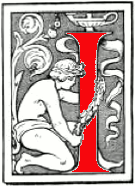
t seems that my whole literary life has been dominated by fruitful chance encounters. John Ruskin was an especially fortunate discovery, and I hope you don’t mind if I indulge a spot of autobiography to help explain why Ruskin means so much go me. For some while I had been purchasing books that our local libraries no longer had a use for, The Dictionary of National Biography (20 volumes), the Complete OED, The Grove Dictionary of Music and Musicians and The Grove Dictionary of Opera (music is my principal field of work).
I was collecting the Opera dictionary when I happened to ask the librarian Chris if there was anything else on offer. ‘Well we do have these Ruskin books,’ he said, and then escorted me to a room where – now, get this! – the complete 39-volume Cook and Wedderburn Ruskin was sitting in boxes gathering dust, each volume individually numbered. Prior to this weekend visit I had dipped into Ruskin with mild interest, but remembered very little of what I read. So I came up with a plan. Why not go home, read the very sizeable Ruskin article in the Dictionary of National Biography and on the strength of that decide whether I wanted to invest the cash (and the space!) for these handsome volumes. That night, my reading done, Ruskin won me over and early the next week I collected the volumes.
I have to admit a certain level of bemusement. Didn’t Chris want to put the books on Ebay? No, was the answer, he’d much rather find a loving home for them, assured that they would be used and studied by someone who valued them fully. Bound volumes of Punch and Illustrated London News followed – don’t ask me how I manage to move in our little end-terrace house – but suddenly I switched from having limited interest in the Victorian era to being swept up in a tsunami of fascinating Victoriana.
So why Ruskin, I mean for me in particular? A number of reasons, some of them autobiographical. My mother’s family is of Ukrainian-Jewish extraction and her siblings include Philip and Donald Zec, Philip (1909-1973) a celebrated cartoonist during the war and Donald, a distinguished writer and for many years the film critic of the Daily Mirror who is shortly to celebrate his 100th birthday. I mention these uncles of mine (both are featured on Wikipedia) because their presence during my youth – the draftsmanship on the one hand, and journalism on the other – helped fashion my future interests. I began drawing at a very early age. In fact I passed the entrance exam for the Hornsey School of Art but instead of attending decided to start work early. I was hungry for what in those days was termed ‘real life’. Like Ruskin, as a youth I wrote sheaves of poetry, most of it extremely poor (hence the fact that I burned virtually all of it); I drew, have kept journal/diaries for the past forty years and have a hunger for literature that remains unabated even as I write this. So you can see why the great JR struck an instant chord with me.
And so to the works themselves. When I first inspected the boxed volumes, I picked up the autobiographical Praeterita and was affected by both its charm and its grandeur, the language couched in terms that combined biblical rhetoric with writing that was quietly confessional. The Seven Lamps of Architecture (text) also fascinated me while Unto this Last proved a true source of inspiration. The knowledge that Ghandi, Proust, and Tolstoy had held Ruskin so close to their hearts spurred me on in pursuit of more Ruskinian knowledge. I soon purchased Tim Hilton’s superb (and very sizeable) biography, reading carefully and adding pencil annotations to the margins of each page. Derrick Leon’s Ruskin: the Great Victorian approximated a Ruskinian style of writing that I still find compelling. Once I finished the book I scribbled a note along the frontispiece to the effect that Leon’s xRuskinx is as important for the great critic’s rehabilitation as Walter Kaufmann’s Nietzsche study was for the re-learning of Nietzsche’s work once the Second World War was over and unsavoury Nazi associations could finally be laid to rest.
Of course I’m not suggesting that Ruskin is tainted by profoundly ‘wrong’ politics – he was by his own admission both a tory and a socialist, after a fashion – more that he transcended his age and, most important, he was a profound prophet of ills that trouble our own, whether it be environmental pollution, social injustice, botched renovation, artistic dishonesty, or inadequate education … the list goes on and on. As a keen promoter of key artists of his era, Turner especially, he was a major force for the good and if his well known amatory pursuits still court some of controversy (though Robert Brownell has dispelled a number of previously prevalent myths in his admirable Marriage of Inconvenience) they shed interesting light on how he viewed the nature of love. Other fine works worth searching out are by Robert Hewison (most recently Ruskin and his contemporaries), Cynthia Gamble (specifically in relation to Ruskin and Proust) and most recently Andrew Hill’s Ruskinland which approaches the subject from a decidedly contemporary perspective.
All this (I could go on and on) from a Ruskin novice – my ‘discovery’ is barely three years old – and I’ve hardly touched the surface of this colossal oeuvre (there are letters and diaries beyond the collected edition) . John Ruskin was a world within a world that is still too often misunderstood. If I were granted another lifetime I would spend it in pursuit of greater knowledge regarding his work but as it stands this grateful 70-year-old is deriving untold pleasure from reading the works, either first-hand (always preferable) or as analysed and annotated by those whose knowledge exceeds my own many times over.
Last modified 20 February 2019